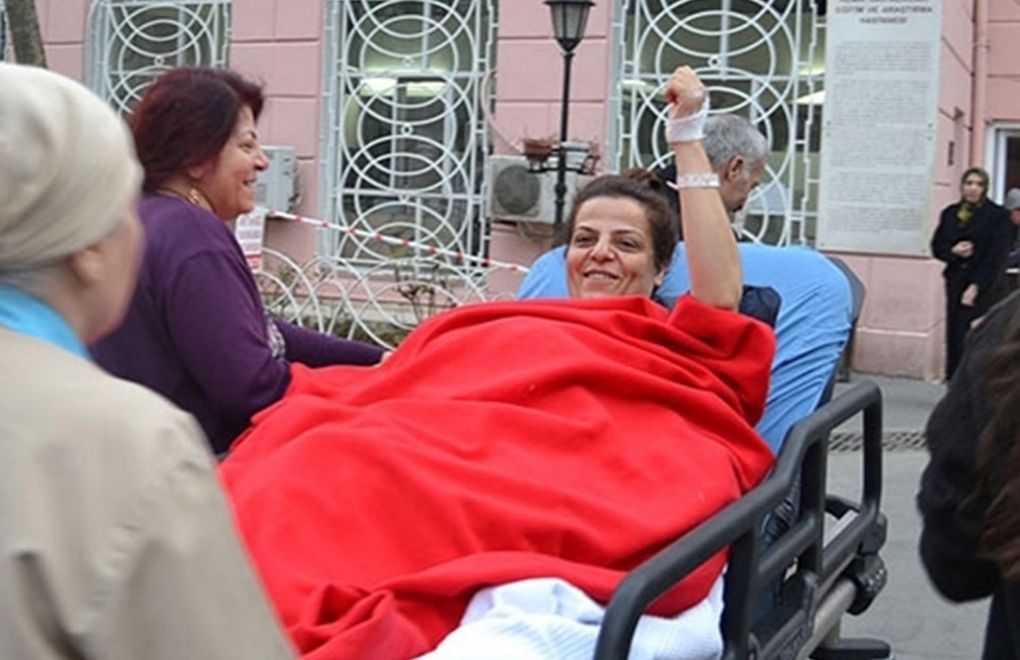* Photo: Mezopotamya Agency (MA)
Click to read the article in Turkish
Democratic Regions Party (DBP) former provincial general assembly member Sibel Çapraz was wounded in her arm as a result of the random shooting of police officers during the blockade on the neighborhoods of Yeşildere and Dize in Yüksekova district in Turkey's Kurdish-majority southeastern province of Hakkari on November 27, 2015.
The Constitutional Court has handed down its judgement on Çapraz, who applied to the supreme court on the grounds that her right to life and the prohibition of ill treatment was violated by what she had gone through.
Examining the application of Çapraz for a possible violation of the prohibition of ill treatment as she was held in prison even though she was not in a medical state to sustain her life on her own, the Constitutional Court has found the application "inadmissible."
As reported by Yüksekova News, the supreme court has ruled that Sibel Çapraz shall be paid damages over the failure of the authorities to investigate the issue over a possible violation of her right to life.
Violation of right to life
The Constitutional Court has concluded that the right to life of Sibel Çapraz has been violated in consideration of both the material facts and the legal procedure on the grounds that no investigation was carried out into the incident of injury even though she had clearly expressed her criminal complaint about her injury in both her statement taken by the Chief Public Prosecutor's Office and the interrogation of the judgeship.
Ministry said, 'She had not applied'
The Justice Ministry submitted its official opinion on the application of Sibel Çapraz. Indicating that she had been wounded as part of a criminal investigation launched against her, the Ministry argued that Çapraz had not applied to the Chief Public Prosecutor's Office about the incident of injury.
Life-threatening condition is certain
The judgement of the Constitutional Court has noted that there is no concrete information or document indicating how the applicant was injured and added, "However, it is certain that the applicant was wounded with a gun and went through a life-condition as a result of this incident."
"Therefore, the Article 17 of the Constitution safeguarding the right to life is applicable to the concrete application," the Court has concluded.
As there was no investigation into the injury, the Court has noted that it is not possible to examine the alleged "violation of the principle of equality" on the grounds that there are no documents or information.
It will be considered on procedural grounds
The Constitutional Court has concluded that the violation of right to life will be examined on procedural grounds:
"There is no concrete information or documents showing how the applicant was injured. In fact, in her statement to the Chief Public Prosecutor's Office, the applicant did not mention an operation carried out by security forces and stated that she did not remember how she had been wounded. In her application, she expressed her opinion that she was wounded by the shooting of security forces and complained that no investigation was launched against the persons who had caused her wounds.
"Accordingly, an examination to be made as to the right to life will inevitably be limited to the procedural aspect of the right to life."
Violation on procedural grounds
The Constitutional Court judgement has underlined that no investigation was launched even though Çapraz indicated that she pressed charges against the persons who had caused her to be wounded.
The judgement has further stressed that carrying out an investigation to find out whether the negative obligations were violated in the related incident of injury is a Constitutional obligation. Accordingly, the supreme court has concluded that her right to life guaranteed by the Article 17 of the Constitution has been violated on procedural grounds.
Ill treatment
In her application to the Constitutional Court, Sibeş Çapraz also argued that the prohibition of ill treatment was violated as she was arrested while she was still in treatment for her gunshot wounds.
Examining this application under three headings, the Court has found this application "inadmissible" due to the violation of statutory limitations.
Treatment process was delayed
Çapraz also made an application on the grounds that "the medical care provided to her in prison was insufficient."
Referring to Çapraz's requests for being transferred to a hospital, the Constitutional Court has found this application "inadmissible" as well on the grounds that there is no information or documents indicating whether she made an application to the judgeship of execution about the failure to send her to hospital and that the legal remedies have not been exhausted.
Examining the allegation that "the conditions of the penal institution were not suitable for the health conditions of the applicant," the Constitutional Court has found this application "inadmissible" on the grounds that Sibel Çapraz did not apply to the judgeship of execution.
Çapraz to be paid damages
All in all, the Constitutional Court has ruled that Sibel Çapraz shall be paid 54 thousand lira in non-pecuniary damages on the grounds that the necessary measures had not been taken in the operation and that no investigation was carried out into the incident of injury.
The ruling of the supreme court will now be sent to the Yüksekova Chief Public Prosecutor's Office so that the responsible parties can be investigated in the light of the recent ruling of right violation.
What happened?
Shot during the curfew in the district of Yüksekova in Turkey's Kurdish-majority southeastern province of Hakkari on November 27, 2015, Sibel Çapraz was severely wounded. Taken to a hospital, Çapraz was arrested on March 2, 2016 as part of the investigation launched against her. When she was arrested, her treatment was still going on.
She underwent 15 surgeries throughout her treatment for 96 days. When she was arrested, she was discharged from the hospital in İstanbul to undergo a surgery at Van Training and Research Hospital.
Severely wounded and having serious health problems as a result, Sibel Çapraz's release was demanded by several NGOs, including Amnesty International. Çapraz was sent to hospital with her colon outside her body and the treatment of her arm interrupted.
At her fourth hearing on February 28, 2017, Çapraz was released to house arrest. She was then sentenced to 7 years, 6 months in prison on charge of "being a member of a terrorist organization."
The appeal process is still ongoing. (TP/SD)







